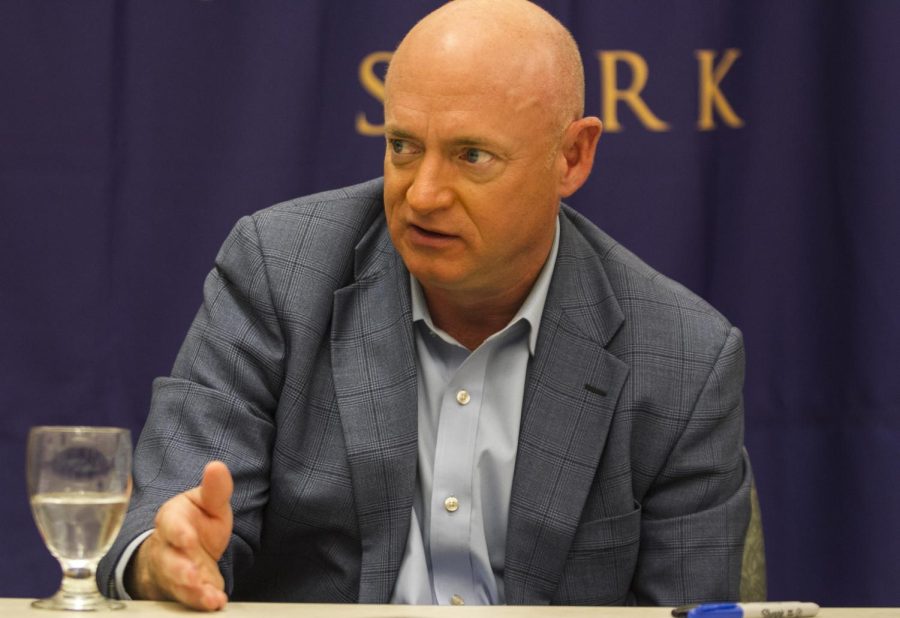Former astronaut visits Stark campus
Retired astronaut and engineer Mark Kelly during his Q&A session at the Kent State Stark Conference Center on Wednesday, March 30, 2016.
Mark Kelly, along with his twin brother Scott, aspired to be an astronaut since the second grade. Now, he is known as an American astronaut, war hero and retired U.S. Navy Captain.
Kelly is on an 18-day trip touring the country. On Wednesday, he stopped in Canton at Kent State’s Stark campus for a Q&A session. His mission was to enlighten students, faculty, staff and the public about his journey through space.
“A space shuttle is a great spaceship. It’s a decent rocket ship and it’s the worst airplane,” Kelly said. “It is hard to sleep in zero gravity; your body gets rid of fluid. When you move your head, it feels like you’re tumbling. You’re wearing a pressure suit and a helmet.”
Kelly conveyed the need to fight tiredness and perform at a high level at all times. There is only one chance to get it right—if something goes wrong, it could be deadly.
As Kelly spoke on the ups and downs of being an astronaut, he moved the conversation to the subject of his wife, Former U.S. Rep. Gabby Giffords. When Kelly was training for his last flight, his wife was having brain surgery.
Giffords was nearly assassinated in 2011 after being shot in the head from 3 feet away. Today, she is now healthy and recovered from her injuries. When asked to sum up his wife in a few words, “strong” and “tough” were used.
Being courageous seems to be a theme for Kelly’s family, as his twin brother Scott recently returned from space after being in orbit for 340 days. Mark communicated to the students about his brother’s struggle to be back on earth.
One of Scott’s main hardships, he said, is getting his body back to normal.
“You don’t use your muscles; you don’t need your legs,” Kelly said.
He explained the feeling of being up in space and how it’s not as stellar as one would think.
“You always feel like you have a cold,” Kelly said. “(Your) head is stuffed up because of fluids, (you) can’t put anything down (and) you have to Velcro things to the wall; you’re just floating.”
The Kelly twins share something extraordinary that not many people can relate to. It helped that both Kelly brothers were astronauts and could relate to the same situations and understand what the other was dealing with up in space, Kelly said. He used the example of fixing the carbon dioxide removal system; not a lot of people could contribute much to that conversation—but he could.
Kelly talked about the National Aeronautics and Space Administration (NASA) and some of its missions.
“We have a lot of people on the space station, learning what it’s going to take to go to Mars,” he said.
Kelly spoke further on the 400 different experiments going on at the space station.
“We have researchers in physics, chemistry, life science, material science, biology and earth science (who) obtain a lot of information that’ll change society,” he said. “This type of stuff takes decades and it’s a big part of human space flight program.”
One of the biggest research projects going on at NASA involves the study of climate change. NASA is one of the leading researchers in global climate change and is finding ways to answer questions, like what the long-term consequences are of what we are doing on Earth.
The studies being conducted reveal how human’s actions impact the Earth; Within the next 30 years the temperature is expected to change by another two degrees. Detrimental effects may take place as a result, according to Kelly.
“Methane that is released from the tundra in the Arctic is going to accelerate, and the ice in Greenland is melting at a quick rate,” Kelly said. “These are just some of the things we need to try and prepare for.”
Kelly and Scott now find themselves in the middle of a study of more than 10 research universities such as Stanford, Purdue, Cornell, Harvard Medical School and Frankford University. They have been collecting data for the past two years regarding people who endure long periods of space travel. Kelly goes to NASA once a quarter to give blood, urine and saliva samples as well as get MRIs on his brain and ultrasounds.
As one of the country’s most experienced pilots, Kelly now has more than 6,000 flight hours in over 50 aircrafts. Prior to retiring from active space travel in 2011, he spent over 50 days in space and completed 39 combat missions.
Alyssa Ronyak is a regionals reporter for the Kent Stater. Contact her at [email protected].



